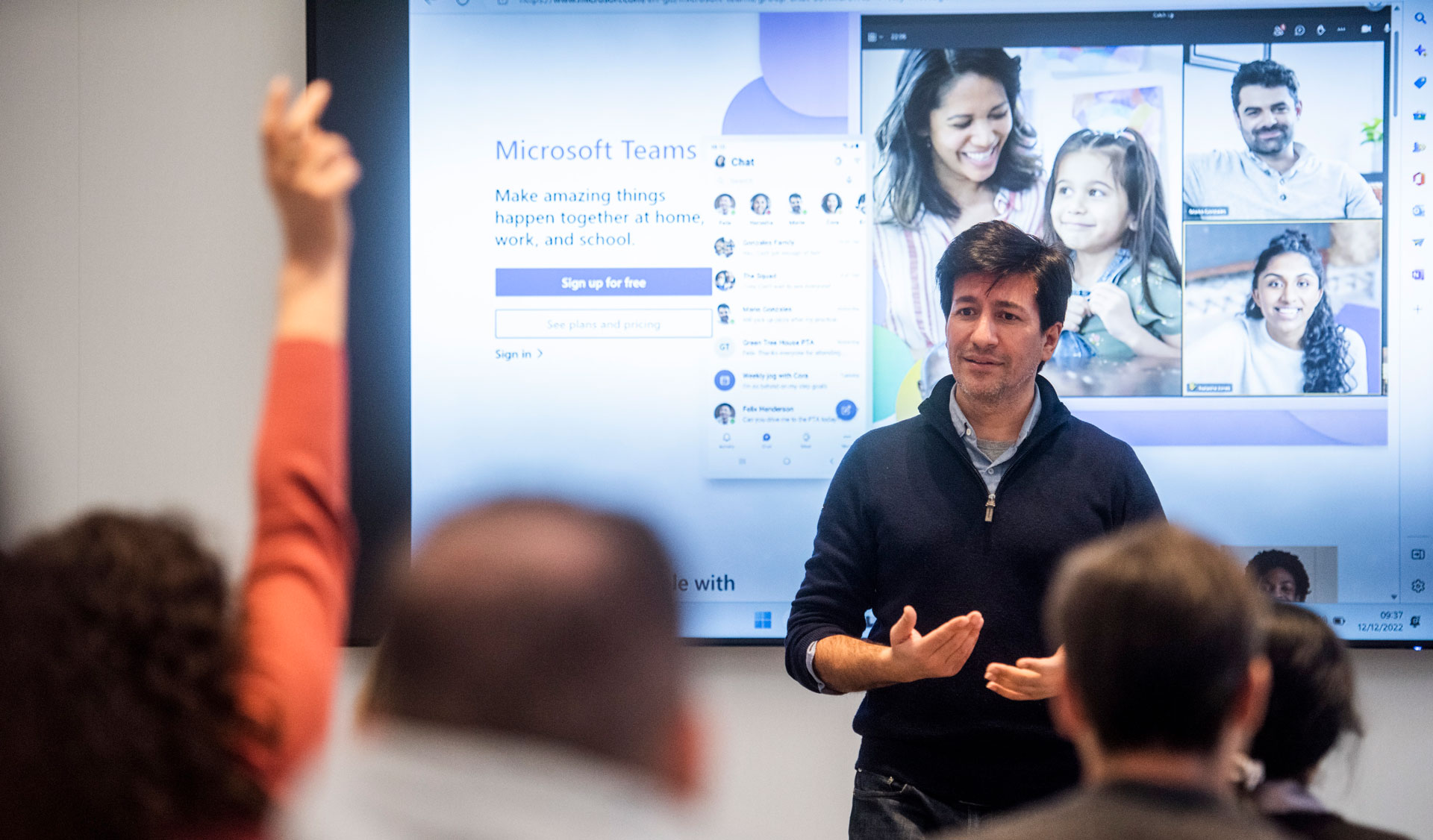
Equip the public sector with digital skills for better government
If we close the digital skills gap in government, we can produce better outcomes for everyone. The way to do it is to put public-sector employees in the driving seat
The UK government has identified digital transformation as the secret sauce that could help improve public services despite budget constraints. But it lacks the people with the right skills to deliver that transformation. Its Central Digital and Data Office points to almost 3,900 vacancies in data and technology roles in the Civil Service alone; four per cent of people in the organisation are employed in digital roles, around half the average in the private sector.
“The biggest challenge is the speed of change,” says Simon Lambert, Chief Learning Officer at Microsoft UK. “There is this absolute need to transform the skills of government to keep up with the constantly changing nature of technology.” The rewards for doing so are wide-ranging, from enabling policymakers and administrators to make far more informed decisions about where, how and when to deliver public services, to making such services more accessible than ever before. Plus, people themselves want new skills; Microsoft research suggests 76 per cent of employees would stay longer at an organisation that offered them learning and development support.

The Government itself has ambitious goals. Its “2022 to 2025 Roadmap for Digital and Data” promises a “new era of collaboration on digital transformation”. But without closing its digital skills gap, it will struggle to deliver. “There has to be an overall level of digital literacy that enables people to feel confident about using technology-based solutions to deliver a service,” says Faith la Grange, Director of Government at Microsoft UK. “Digital leadership is crucial, too: we should expect our leaders to understand what digital transformation can deliver for their organisations.”
Helping people to help themselves
One way to close the skills gap at speed will be to put public sector workers in the driving seat. For example, working with Socitm, the membership organisation of digital leaders, Microsoft developed the “Change Agents” programme with the aim of creating a generation of standard bearers for digital skills in local authorities and public sector organisations across the country.
The initiative offered employees a two-pronged approach to enhancing their digital skills: a focus on the psychology of change, and training on Microsoft technologies including familiar and completely new applications. They also spent time with peers already using technology to transform public services, to discuss common themes and goals. Crucially, they were equipped with skills for passing on their learning to colleagues once they returned to their usual roles. The aim was to create a chain reaction of upskilling and transformation.

“The challenge is to create an opportunity to prevent that reinvention of the wheel,” says Nadira Hussain, CEO of Socitm. “We’ve all got the same issues and challenges, so we need to consider how we can create a means to respond to these at scale. Providing the necessary skills is one priority. Secondly, as we’re all creating similar business-case template assets and resources, we need a single go-to place where we can access proven outputs and collateral that will help us deliver the outcomes we want to achieve within our organisations.”
The best way to do that, says Hussain, is to work with individuals determined to drive change at a local level, rather than imposing transformation from above. “These champions have created communities of best practice both within their own organisations and across the public sector to help propagate the change at pace and scale.”
New agencies for learning and development
Another opportunity to upskill the public sector is to create new delivery mechanisms for digital learning and development. The Scottish government, for example, has set up the Scottish Digital Academy, with a mission to support digital skills and leadership across the country’s public and third sectors.
To achieve those goals, organisations are increasingly looking to partner with private sector organisations. In October, the SDA announced a deal with Microsoft to run a new cloud training and certification programme for the agency’s clients, building on existing Microsoft training programmes. “This further expansion of what the SDA offers demonstrates our ongoing commitment to supporting everyone across the public sector to build the skills and capabilities we need,” says Yorath Turner, Deputy Director at Digital People, Strategy and Corporate Services in the Scottish Government.
It's a lesson that can be applied widely, says Glen Robinson, National Technology Officer at Microsoft UK, with partners to the public sector developing content for learning and training. “We’ve gone through the Government’s digital, data and technology roles and mapped out a curriculum for people aspiring to those,” he explains. “We say, ‘If you’re in this profession, here is the training you now need to do.’”

Making digital easy
Equally, public sector organisations are going to have to recognise that digital transformation is not the sole responsibility of the IT department, or staff with highly specialist skills. Broadening the number of people working on digital initiatives will get organisations to their goals more quickly and increase levels of digital literacy in the process; that should help departments to drive efficiencies through improved collaboration.
‘No-code’ or ‘low-code’ technologies could play a significant role here. These are solutions that enable employees with even relatively meagre digital skills to create and fine-tune technology that enables them to do their jobs more effectively. “We can empower people to innovate for themselves,” says Microsoft’s Glen Robinson. “These are the people at the point of delivery of a service who understand what is needed to improve the citizen experience; we can help them become part of the innovation story.”
For example, Transport for Wales invested in a suite of new technologies to help it operate more effectively, and then used Microsoft’s Power Apps to help the rest of the workforce to interact with the new infrastructure. The team built a dedicated timesheet app that staff run on their mobile phones, making it far easier for them to embrace the agency’s new digital capabilities.

How to get started
Microsoft’s Simon Lambert describes such initiatives as “pockets of success” – the challenge now is to build on those examples to drive transformation at scale. That won’t be straightforward, Lambert concedes. “We have to try to shift the culture across the parts of government that aren’t yet undertaking these initiatives – to create a positive mindset about the skilling and learning journey,” he says. “Then you’re in a position where people want to learn and grow – and where they work together to develop, innovate and create those exciting opportunities.”
Faith la Grange at Microsoft is optimistic. “You have to put time and effort into letting people learn,” she says. “And for the next generation, digital literacy is already the norm.” Making that leap across the workforce will bring significant rewards. The promise of a digitally empowered public sector is an array of public services that provide citizens with the support they need in every area of their lives – and do so far more efficiently than ever before.












